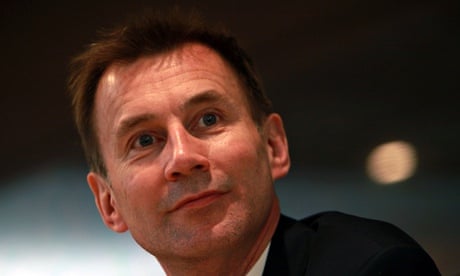Sharing health data is immensely important, Jeremy Hunt reminded MPs. It was by studying lots of people's medical records that doctors learned thalidomide was harmful, that MMR was proved to have no link to autism, that we discovered smoking caused cancer. And that was why the government had rummaged down the back of the sofa, found the remote control, and pressed pause on its plan to gather the nation's GP records.
It had been "absolutely right" for the organisers of the new Care.data scheme to pause its rollout, the health secretary told the Commons. This would allow them to put the kettle on, nip to the loo and win round the public to the prospect of their intimate medical information being uploaded to a central database to be shared with outside bodies managed by people who seemed not fully clear what they were up to.
They like to take little comfort breaks at the Department of Health. You will recall that, in 2011, following intense opposition from health professionals, this government's health bill was also paused to allow a "listening exercise" that led to the re-drafting of the bill. (Those who listened especially closely might even have heard the subsequent tap on the shoulder of Hunt's predecessor Andrew Lansley, and Cameron's whispered "You're fired".)
Labour leapt at the first mention of "the pause". "When we had a pause before, the result was a very good Health and Social Care Act!" countered Hunt. Shadow health secretary Andy Burnham set his face to "scoff". When Hunt was appointed, he had declared it his mission to have a data revolution but "the only revolution he has created," said Burnham, "is a growing public revolt" against the Care.data scheme.
This clearly couldn't stand. The opposition weren't the only ones who could fling slightly lame, pre-rehearsed insults across the dispatch box. "The shadow secretary of state searches for NHS crises with about as much success as George Bush searching for weapons of mass destruction!" said Hunt, rather proud of that one. Burnham flapped a copy of the "useless glossy leaflet" that advised people on their right to opt out, the one the government said had been received by every household but demonstrably had not.
Hunt flapped back: it was a bit rich for Labour to complain about the method for opting out when the previous government hadn't offered an opt-out option at all. Happily, several hours later the opposing sides found common ground, when MPs on the cross-party health select committee united to deliver a spirited kicking to the Department of Health, NHS England and the Health and Social Care Information Centre, the bodies overseeing the Care.data rollout. Why had the process been started without any code of practice in place, asked Conservative Charlotte Leslie. "It seems like you have got a half-built machine." Labour's Rosie Cooper said she had opted out of the scheme "Why? Because I don't trust you and I don't consider myself a commodity to be bartered around by you." Never mind pressing pause, sounds like someone needs a screwdriver and basic operating instructions.

